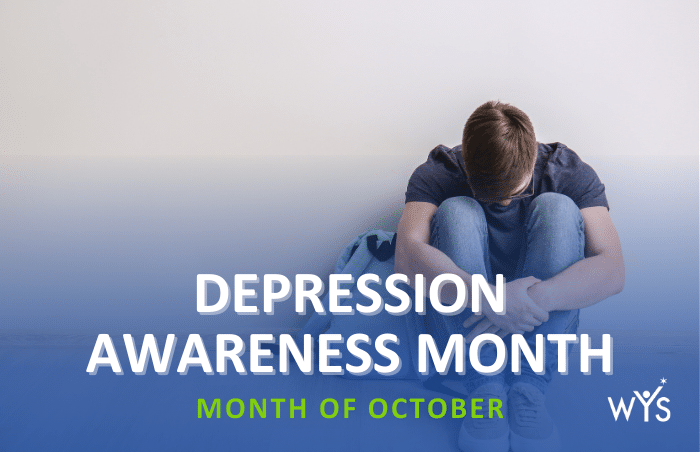
As we welcome October, we also recognize the significance this month brings. October is National Depression Awareness Month. Anyone may be susceptible to experiencing depression depending on many different factors. This is why it’s so imperative that we bring awareness to the signs, types, symptoms and treatments of depression. Mental health awareness – in and of itself – is crucial, but it is especially crucial for youth.
In this post, we’re going to be discussing important topics including depression in youth, the various types, the signs to look out for and just how common it truly is. Research has shown that Adverse Childhood Experiences (ACEs)—such as abuse, neglect, and household dysfunction—can significantly increase the risk of mental health challenges, including depression.
The Prevalence of Youth Depression
Did you know that 1 in 5 adolescents experience a mental health disorder, and depression is one of the most common? (NIMH). With youth mental health disorders such as depression on the rise, early identification and intervention is key. Early intervention can lead to several positive outcomes including; reduced severity, a stronger prognosis, improved quality of life, smaller risk of social and academic issues, and better social and emotional development.
Learning about and building resilience and offering support can make a significant difference in the prevention and treatment of youth depression. At WYS, we offer a comprehensive program called Super Resilient Youth (SRY), consisting of a research-based mental wellness curriculum used to provide the tools youth need to heal, navigate adversities, & to become leaders who break the cycles caused by trauma in this generation. Interested in our SRY program and want to learn more? Click here to discover more information.
Signs of Depression in Youth
There are many signs that may point to a diagnosis of depression, but some of them may present differently in adolescents. According to the CDC, the common signs and symptoms of depression in both children and teenagers include, but are not limited to;
- Withdrawal from friends and activities
- Irritability
- Changes in sleep or eating patterns
- Persistent feelings of sadness or hopelessness
- Struggling to focus
- Showing self injury or self destructive behavior
It’s incredibly paramount that people make themselves aware of the signs of depression in youth, as they can differ from those of adults.
Types of Depression in Youth
Depression is not a “one size fits all” diagnosis. There are actually different types of depression that adolescents may experience. Research provided by the National Institute of Mental Health (NIMH), showcases the different types of depression in youth that vary based on specific circumstances. The different types of depression that can affect youth include:
Major Depressive Disorder – This type includes symptoms of depressed mood or loss of interest that interfere with daily activities and have been occurring for at least two weeks or more.
Persistent Depressive Disorder (Dysthymia) – Typically includes less severe symptoms of depression that last much longer, usually for at least two years.
Seasonal Affective Disorder (SAD) – A form of depression that comes and goes with the seasons, with symptoms typically starting in the late fall or early winter, then going away during the spring and summer.
Impact of ACE’s on Youth Mental Health
Adverse Childhood Experiences, or ACE’s, are classified as stressful or traumatic events that occur in childhood (0-17 years of age) which can have long-term impacts on their health and well-being.
Examples of ACE’s provided by the CDC include, but are not limited to:
- Abuse
- Neglect
- Household dysfunction
- Violence
- Parental separation
When a child experiences ACE’s, they are known to potentially be at a greater risk of developing a mental health disorder. Depression is among the most common issues linked to children that have lived through ACE’s. While the previous information may feel looming, resilience building and support can have a lasting successful impact on depression in youth. At WYS, that’s what we do. We believe in evidence-based practices that are scientifically proven to help children, youth and families build resilience. Click here to contact us today for more information or to schedule a consultation.
Depression Support Resources
If you suspect that you or someone you may know might be struggling with depression, you’re not alone. You can find free and accessible resources for support listed below:
988 Suicide & Crisis Lifeline: A free, confidential, 24/7 hotline for people in suicidal crisis or emotional distress. You can call or text 988, or chat online at 988lifeline.org.
Mental Health America’s Depression Test: Click here for a free depression screening test.
Western Youth Services: Individualized and solution-focused services are provided at a level, frequency, and duration consistent with each client’s treatment goals using evidence-based practice and practice-based evidence to ensure that every client gets the best possible outcome. Be sure to check out RESET Toolbox and Behavioral Health Training Collaborative, which offer a collection of programs and trainings tailored to help you learn to identify patterns, provide simple wellness techniques to help build resiliency, and know when and where to get professional help, if needed. Examples of trainings include bullying prevention, cyber-security, building resilience, and more.
In conclusion, depression in children and adolescents is a treatable condition with a vast array of support and resources available to help those who may be struggling. We would like to emphasize the importance of support, understanding and taking the first step in seeking help if you find that you or someone you know may have depression. No matter how difficult it may seem, there is always hope for a brighter future with the right support.
If your child or a young loved one is struggling with a mental health concern, we encourage you to reach out to a mental health professional or to contact an Access Coordinator at Western Youth Services by sending an email to [email protected] or by calling us toll-free at 888-312-0406.Orange County, State and National resources can be found on our site here: https://www.westernyouthservices.org/resources/.






